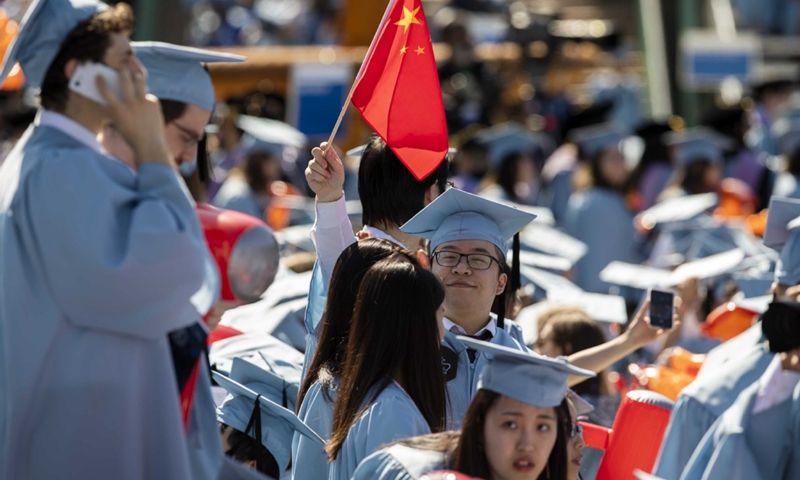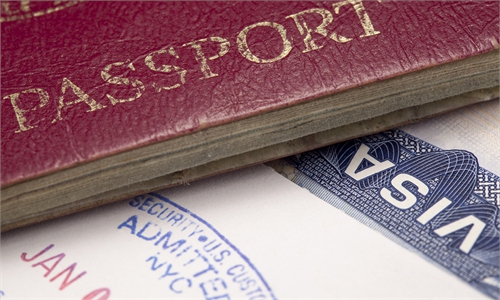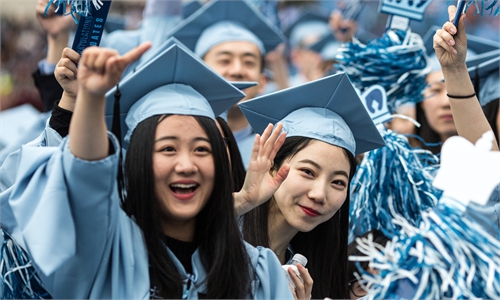Over 1,000 Chinese students plan to sue US for visa restrictions, fear extension to arts, business

Graduate students from China attend the Columbia University Commencement ceremony in New York, the United States, May 22, 2019. Photo: Xinhua
Over 1,000 Chinese students decided to cast away their illusions and file suit after they found that despite the US Embassy in China reopened to process visa applications in early May, strict restrictions on those with high-tech backgrounds remain in place and such restrictions are extended to those applying for study in literature and business.
These students are mainly from eight Chinese leading science universities, which have always been US targets as they are believed to have links to the Chinese military. Students at the schools are accused of carrying the mission of espionage and illegal collection of intellectual property if they are allowed to study in the US.
To address such concerns, then US president Donald Trump issued Presidential Proclamation 10043 in May 2020, which bans Chinese postgraduate students and researchers from studying or working in the US if they had previously been affiliated with China's "military-civil fusion strategy."
"Today, the restrictions are imposed on students from eight schools. Who can guarantee that this ban will not be extended? Today, the students majoring in science, technology, engineering and mathematics (STEM) subjects are affected, who can say if all Chinese students who want to study abroad might be affected some day? Today's silence is the beginning of allowing unwarranted discrimination," the Global Times learned from the initiator who requested anonymity on Sunday.
The initiator decided to resort to legal channels. Claiming to be victims of US political manipulation, the initiator, with over 20 students, has established a website and planned to hire a lawyer to fight for their academic dreams from the destruction by PP10043.
According to the initiator, they plan to hire renowned American civil rights and immigration lawyer Ira Kurzban and they are fundraising money to push the lawsuit ahead.
"So far, more than 1,100 people said they are willing to join us and we hope more could follow," the initiator said.
According to the initiator, the cases they have collected showed although over 80 percent of students are from the eight schools, some are majors in literature and business who are also victims of the policy. Some others are graduate students and visiting scholars sponsored by the China Scholarship Council.
Recently, an open letter written by more than 500 Chinese students to the Chinese Embassy in the US, who complained their visa applications were rejected, have garnered wide public attention.
Chinese Foreign Ministry spokesperson Zhao Lijian said at Tuesday's press conference that the visa restrictions are a continuation of a "poisonous legacy" from the Trump administration.
In response to what the US claimed a measure that will "affect less than 2 percent of Chinese applicants," Chinese Foreign Ministry spokesperson Wang Wenbin said at Friday's press conference that around 3,000 to 5,000 Chinese graduate students will be affected each year by the policy, accounting for 16 to 27 percent of the total number, citing an estimate from Georgetown University.
"I am a student of business and I plan to work in my family enterprise. The visa officer denied me because of my school, without checking my resume for a second. This is unfair and blatant discrimination," wrote one student from Nanjing University of Science and Technology.
"No technology can be developed behind closed doors. If we do nothing today, Chinese students will live under the sword of Damocles forever. All we want is to overturn unfair prohibitions and restore academic freedom," the initiator said.



